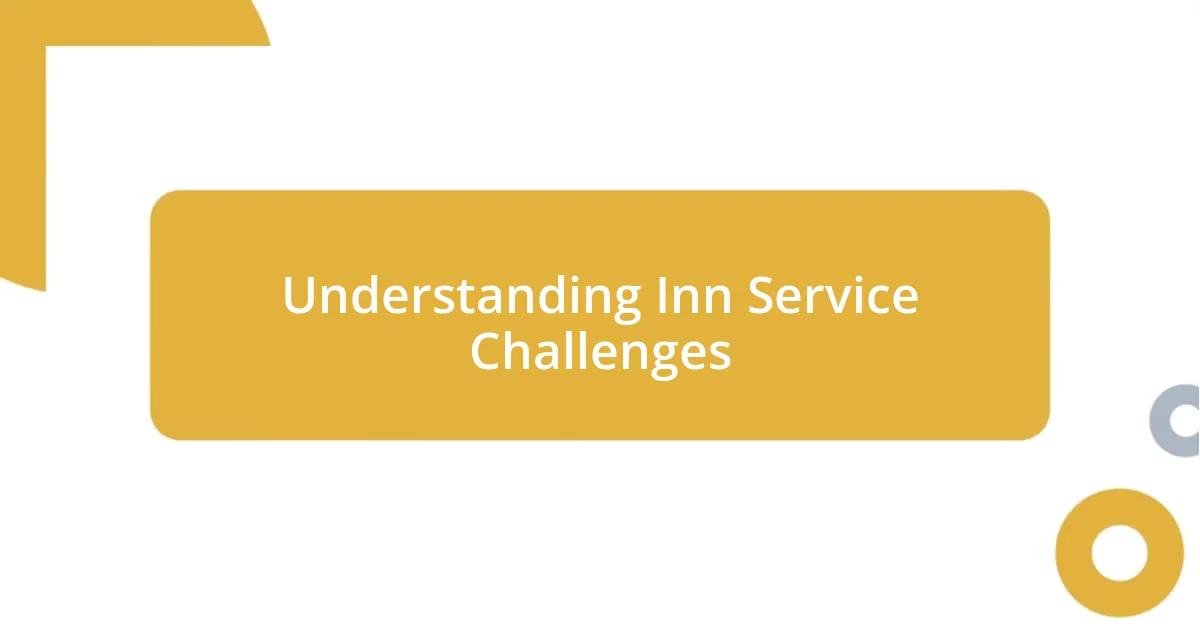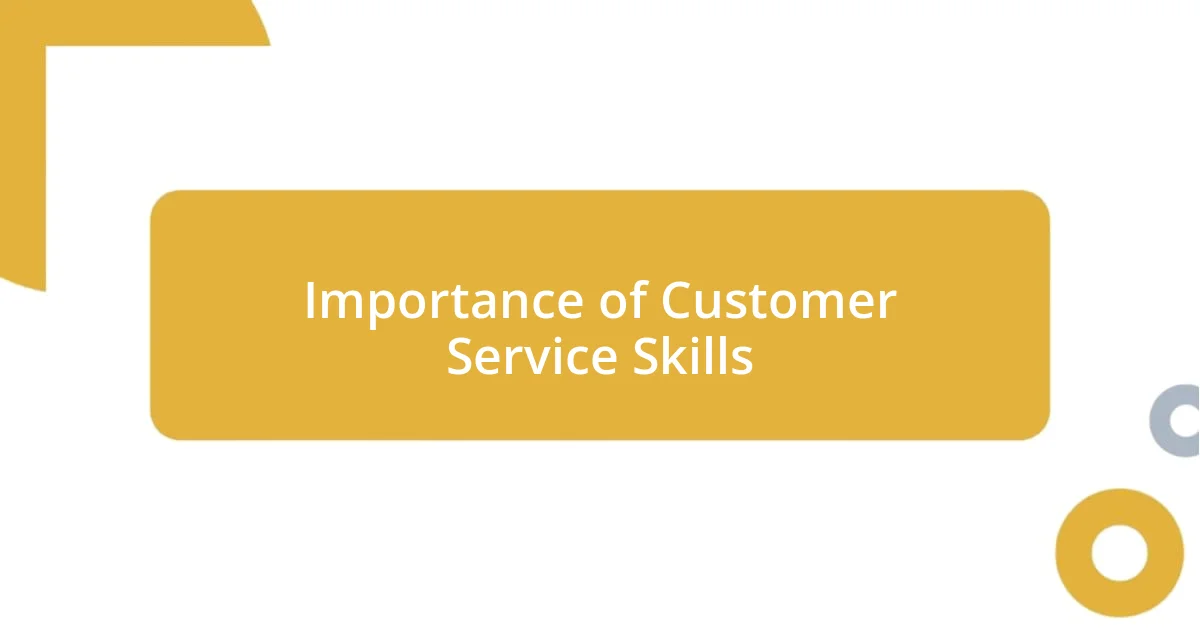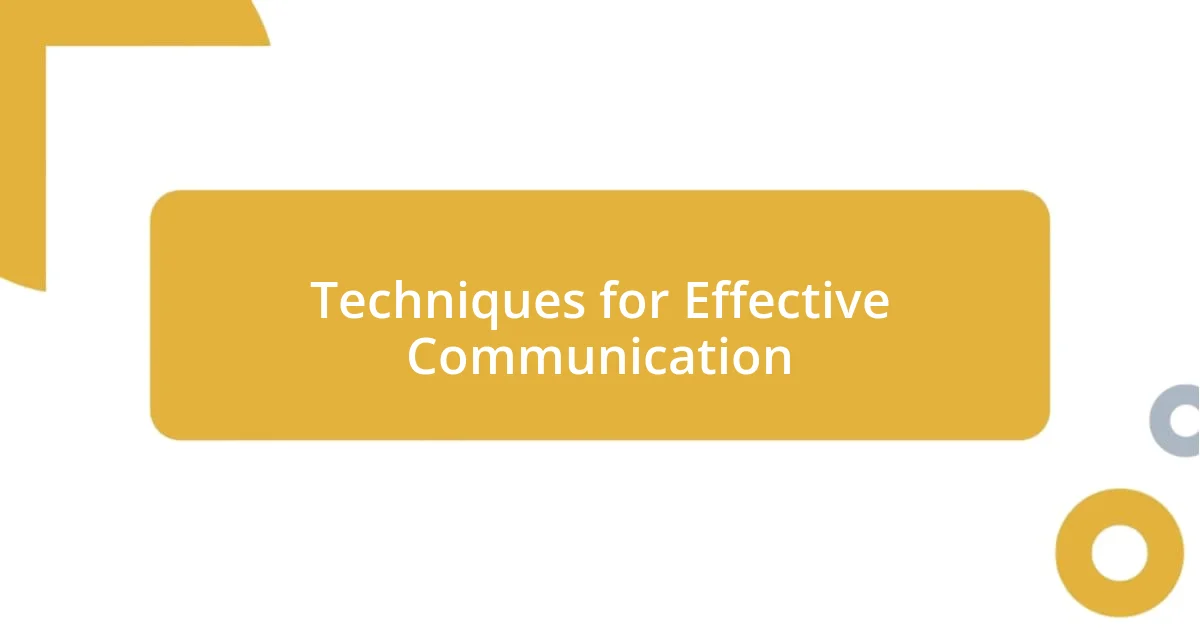Key takeaways:
- Effective communication, including active listening and empathy, can transform guest challenges into positive experiences.
- Managing guest expectations through proactive communication and personalized follow-up fosters loyalty and satisfaction.
- Handling complaints with ownership and tangible solutions can significantly improve guest relationships and turn negative situations into memorable ones.

Understanding Inn Service Challenges
When I think about inn service challenges, I can’t help but recall my own experiences dealing with sudden guest complaints. For instance, one time, a customer was unhappy with their room’s cleanliness. This situation struck me because it underscored how something seemingly minor could lead to major dissatisfaction and impact the overall guest experience. How can we manage such situations with grace and efficiency?
Another significant challenge I’ve encountered is the balance between personalization and efficiency. Guests often crave a warm, personalized approach, yet time constraints can make it tricky to provide attentive service. I remember during a particularly busy season, I tried to remember every returning guest’s preferences while still managing check-ins and room assignments. It felt like walking a tightrope! I often wonder—what strategies could we employ to maintain that personal touch even during peak times?
Lastly, let’s not overlook the impact of technology in today’s inn services. While it offers fantastic resources for managing operations, it can also create a barrier if not utilized effectively. One evening, after a glitch in the booking system led to overlapping reservations, I realized how crucial it is to have a contingency plan. Isn’t it fascinating how technology, which is meant to streamline operations, can also present challenges that test our adaptability and problem-solving skills?

Importance of Customer Service Skills
When serving customers in the hospitality industry, I’ve realized that effective communication is paramount. I vividly remember a day when a guest approached me, clearly upset about a mix-up with their reservation. By actively listening and empathizing with their frustration, I was able to turn a potentially negative experience into a positive one, allowing them to feel heard and appreciated. This encounter reinforced my belief that strong customer service skills can transform challenges into opportunities for connection.
Additionally, adaptability plays a crucial role in delivering excellent customer service. There was a time I was serving a large group for a special occasion, and just as I was ready to serve the appetizers, the power went out unexpectedly. Instead of panicking, I quickly gathered my team and organized a plan to serve candles and inform the group about our new approach. This experience taught me that being prepared to adjust to unforeseen circumstances not only uplifts guest satisfaction but also showcases the professionalism and calm of the staff.
Furthermore, the ability to anticipate a guest’s needs can elevate their experience significantly. I recall a couple celebrating their anniversary who mentioned in passing they enjoyed a particular type of wine. By going the extra mile to have a bottle waiting for them upon their return that evening, I saw their faces light up with joy. Moments like this remind me that small gestures, born out of acute awareness and thoughtfulness, can lead to lasting impressions on guests.
| Customer Service Skill | Importance |
|---|---|
| Effective Communication | Helps in resolving issues quickly and fostering a positive atmosphere. |
| Adaptability | Enables staff to respond to unexpected challenges and maintain service standards. |
| Anticipation of Needs | Enhances guest satisfaction through personalized attention and thoughtful gestures. |

Techniques for Effective Communication
Effective communication in inn service is not just about conveying information; it’s about creating connections. During a particularly hectic check-in period, I found myself at the front desk when a family with young children arrived. Instead of just handing them the keys and moving on, I took a moment to ask the kids about their favorite activities, engaging them in a light-hearted conversation. I noticed how this simple interaction not only eased their travel fatigue but also set a positive tone for their stay. These moments reinforce my belief that when we invest time in genuine communication, it makes all the difference for our guests.
To further enhance effective communication, I’ve learned that clarity is key. To improve our process, I developed a quick reference guide for staff, outlining common guest requests and the best responses. I remember how, during a busy weekend, a colleague used the guide to reassure a guest about amenities and dining options swiftly. It made a notable impact in de-escalating stress. Here are some techniques that I’ve found essential in fostering effective communication:
- Active Listening: Show genuine interest in what the guest is saying to build rapport.
- Open-Ended Questions: Engage guests in conversation by prompting them to share more about their needs.
- Empathy: Acknowledge the guest’s feelings, particularly when they face issues, to help them feel understood.
- Clear Messaging: Use simple, direct language to explain procedures and policies, avoiding jargon.
- Consistency: Ensure that all team members share the same information to avoid confusion.

Creating a Welcoming Atmosphere
Creating a welcoming atmosphere starts with the small details that make guests feel truly valued. I often remember a time when I decorated the lobby for a festive occasion. It wasn’t just about putting up decorations; I took the time to play soft music and arranged seating that encouraged guests to mingle and relax. Witnessing the smiles and laughter in that environment filled me with joy and reminded me of the profound impact such a simple effort can have.
Have you ever walked into a place and instantly felt at home? One day, I noticed that our front entrance lacked warmth, so I decided to greet guests with a genuine smile and a heartfelt “welcome back” to returning visitors. The difference was palpable. Guests began to respond more openly, sharing their stories and experiences with me. This personal touch created an inviting environment where every visitor could sense they belonged.
Additionally, I believe ambiance plays an essential role in making guests feel comfortable. On a particularly busy weekend, I initiated the idea of using essential oil diffusers in the common areas. The soothing scents helped to calm any anxious guests and transformed the atmosphere into something serene. Moments like these not only create a welcoming space but foster connections between the guests and staff, as we all contribute to an environment where everyone feels respected and appreciated.

Managing Guest Expectations Effectively
Managing guest expectations effectively is at the heart of exceptional inn service. I remember a time when a guest showed up expecting a room with a view, but we had inadvertently double-booked it. Instead of shying away from the conflict, I calmly explained the situation and offered them a complimentary upgrade to the best room we had available. Their initial disappointment melted away, and their genuine smile told me I’d turned a potentially negative experience into a memorable one. How often does that happen, right?
Sometimes, setting realistic expectations can be just as valuable as exceeding them. I once took a call from a potential guest asking about our amenities. Instead of merely listing them, I went a step further and described how busy our popular breakfast service can get during peak hours. I recall the relief in their voice when they realized they might want to plan accordingly. This proactive communication not only prepared them for their stay but also helped them feel well-informed and valued. Isn’t it better to manage their anticipation rather than leave them guessing?
I also believe in the power of follow-up communication. After a family checked out, I took a moment to send them a personalized thank-you email, asking them if everything met their expectations. They appreciated the gesture and responded with feedback about their experience. It made me realize that sometimes, just a little extra effort can solidify a guest’s loyalty. Isn’t it fascinating how these small interactions shape our relationships with guests and keep them coming back?

Strategies for Handling Complaints
Handling complaints effectively is essential in providing exceptional service. One strategy that has always worked well for me is to actively listen to the guest. I recall a time when a family was unhappy about noise in their room. Instead of jumping into solutions, I took a moment to hear their concerns. This not only made them feel heard but often diffused their frustration. Have you noticed how just letting someone vent can sometimes make a world of difference?
Another vital approach is to take ownership of the situation. I remember a guest who was frustrated due to missing toiletries in their bathroom. I didn’t just apologize; I immediately offered to personally deliver a complete set within minutes. Seeing their relief when I knocked on the door was incredibly rewarding. In moments like these, I often think, “What would I want if I were in their shoes?” That perspective guides me and ensures I go above and beyond for every guest.
Lastly, I’ve found that offering a tangible solution often transforms the experience. On one occasion, a couple was disappointed by a malfunctioning air conditioner. I promptly arranged for a technician to fix it, and in the meantime, I provided them with a complimentary dinner at our restaurant. Their grateful smiles as they left for dinner reminded me that a simple act can turn a complaint into a cherished memory. How often do we forget that a little kindness goes a long way?

Personal Growth through Inn Service
Reflecting on my journey through inn service, I realize how much personal growth has stemmed from those experiences. One night, a large group arrived late and exhausted after a long drive. Instead of feeling stressed, I took it upon myself to arrange a quick snack for them while their rooms were prepared. The gratitude in their eyes taught me that compassion is a powerful tool, fostering connections I hadn’t anticipated while honing my ability to think on my feet.
Then there was the challenge of a language barrier with some international guests. Initially, the situation felt daunting, but I soon discovered the joy in using gestures and visual aids to bridge the gap. I remember the laughter we shared while trying to communicate. It dawned on me that stepping outside my comfort zone led me to not only improve my interpersonal skills but also to embrace a newfound appreciation for diverse cultures. How often do we allow challenges to become opportunities for connection?
In another instance, I had the privilege of mentoring a new team member who felt overwhelmed by the fast pace of inn service. I shared my own initial struggles, and together we identified small steps to boost her confidence. Watching her bloom from anxious to adept had a profound impact on me, reinforcing the idea that personal growth often intertwines with helping others succeed. Isn’t it fascinating how nurturing someone else’s development can also illuminate your path?















